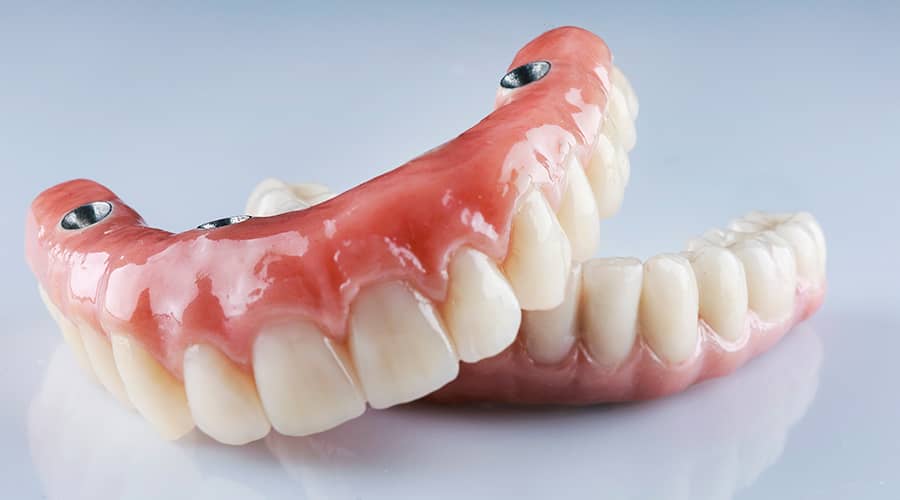
Are you considering dentures or dental implants to restore your smile? You’re not alone. Around 120 million adults in the United States have some form of tooth loss, making dentures one of the most common treatments for missing teeth. Regain your smile and boost your confidence with dentures and implant overdentures.
We care about your oral health and want to ensure you have all the information you need when considering dentures and implant overdentures. If you are searching for dentures Buffalo Grove, dentures near me, or dentist Buffalo Grove, call (847) 215-1511 or complete the online booking form to book an appointment at Morris Dental Solutions.
What Are Dentures?
Dentures, also known as false teeth, are removable solutions for missing teeth. They have been around since ancient times and are custom-made with artificial teeth set in an acrylic base. Conventional dentures restore the look of your smile by filling in the gaps left behind by missing teeth. In addition to improving aesthetics, dentures also help restore chewing and speaking abilities. Dentures are secured in place using natural suction or a dental adhesive.
Increased saliva flow, soreness, and potential difficulties speaking and chewing are all common when with newly fitted dentures, but they will become more comfortable to use over time. Additionally, all remaining teeth must be removed for standard dentures to be placed.
Benefits of Conventional Dentures:
- Low cost relative to other tooth replacement treatments
- Can be adjusted to fit any size mouth
- Easy to clean and care for
- The most affordable option for missing teeth restoration
What Are Implant Overdentures?
Implant overdentures, also known as Implant-supported dentures or snap-on dentures, are a combination of dentures and dental implants used to support and secure the denture in place. Dental implants act as anchors, holding the false teeth securely in your mouth. There are no embarrassing slips and no need for messy adhesives or other forms of retention, meaning implant overdentures are the most secure and comfortable option. Implant overdentures also help preserve the jawbone, preventing bone loss and facial sagging associated with missing teeth.
Benefits of Overdentures:
- Better stability than traditional dentures
- Prevent bone loss in the jawbone
- Improved chewing and speaking abilities
- Long-lasting solution with proper care
- More natural look and feel than dentures alone
- Preserve remaining teeth if present
Which Option Is Better for Me?
We understand that deciding between dentures and implant overdentures can be overwhelming. We are here to help you make an informed decision based on your unique oral health needs.
During your consultation, we’ll review your medical history, examine your teeth and gums, and discuss the advantages of each treatment. We will also explain potential risks or side effects to help you make an informed decision.
How Implants Protect Against Bone Loss
Bone resorption (bone loss) is a common side effect of tooth loss. Tooth roots stimulate the jawbone, keeping it strong and healthy. Without the stimulation provided by your natural teeth, the gums and jaw bone start to deteriorate over time, leading to weakened dentures, facial sagging, and an aged appearance. Implant overdentures help prevent this bone loss by providing stimulation to the jawbone, and this stimulation helps preserve the jawbone and prevents facial sagging.
Oral Care and Hygiene
Good oral hygiene habits are essential to ensure your dentures and implant overdentures last a long time. Cleaning your dentures daily is essential for maintaining oral health and preventing gum disease. Traditional dentures must be removed at night and soaked in a denture cleaning solution to prevent bacteria and plaque buildup. Implant overdentures stay in place, so they must be brushed and flossed just like natural teeth.
Summary
- Dentures, also known as false teeth, are removable denture solutions for missing teeth. Dentures are secured in place using natural suction or a dental adhesive.
- Implant overdentures, also known as Implant-supported dentures or snap-on dentures, are a combination of dentures and dental implants used to support and secure the denture in place.
- Implant overdentures also help preserve the jawbone, preventing bone loss and facial sagging associated with missing teeth.
- Good oral hygiene habits are essential to maintaining dentures and over-dentures.
Are You Ready To Restore Your Smile?
Dentures or implant overdentures could be the perfect solution if you are missing teeth and looking for a reliable solution. Morris Dental Solutions offers both traditional and implant overdentures to help restore your smile. To book an appointment, call (847) 215-1511 or complete the online booking form.
If you are searching for dentures Buffalo Grove, dentures near me, or dentist Buffalo Grove, trust the experts at Morris Dental Solutions! Our dedicated team proudly serves the communities of Barrington, Arlington Heights, Long Grove, and Highland Park.
Call UsDenture and Overdenture FAQ
Traditional dentures can last anywhere from 5-8 years if properly cared for, while implant overdentures can last up to 20 years with proper care and regular checkups. The better you care for your dentures and implant overdentures, the longer they will last.
Dentures should be worn at least 8 hours a day or more. Wearing dentures during sleep is not recommended; traditional dentures and overdentures must be removed and cleaned every night. Your gums need a minimum of 6 to 8-hour break from the dentures.
Implant overdentures are generally not painful, but you may experience discomfort or soreness after implant surgery. This can be managed with over-the-counter pain medications prescribed by your dentist and should go away in a few days.
It is important to avoid eating sticky, hard, or crunchy foods with dentures. These types of food can cause your dentures to dislodge, leading to discomfort and potential damage to the denture. Soft foods like eggs, mashed potatoes, soft fruits, and vegetables are best for those wearing full or partial dentures.
